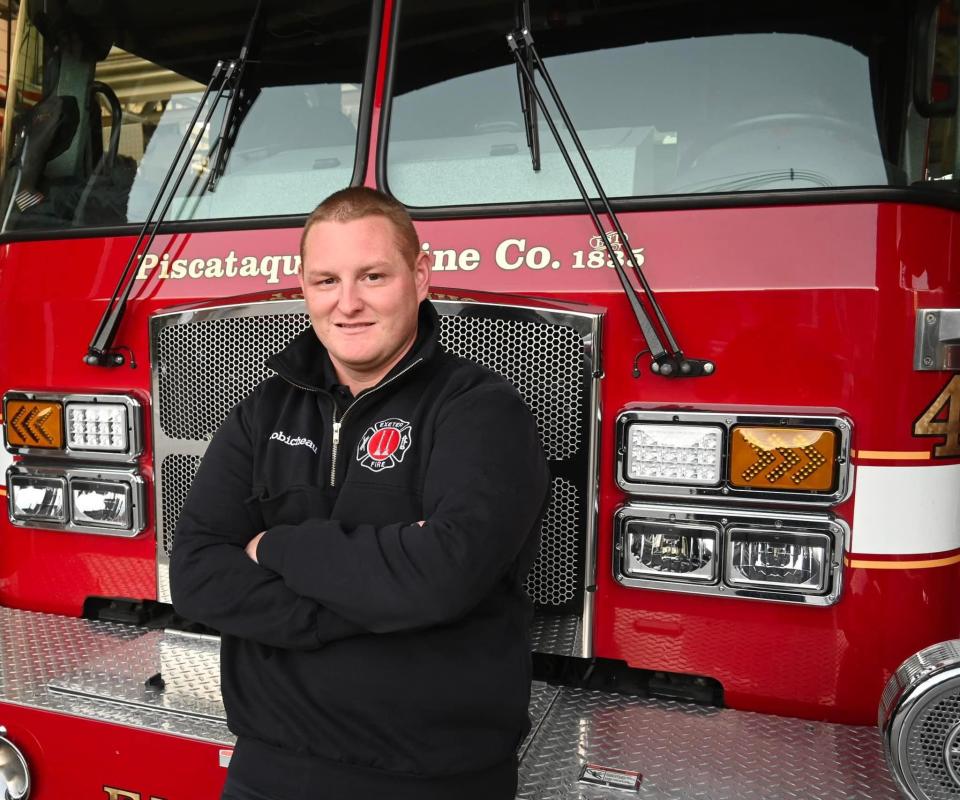A brave new path: Exeter’s fire captain confronts PTSD, bids farewell to service
EXETER — When Fire Capt. Patrick Robicheau became a fire explorer in high school and later joined the Exeter Fire Department as a call firefighter and then a full-time firefighter in 2008, he assumed it would be his forever job.
The Exeter native had a passion for the fire service and excelled, climbing through the ranks from crew chief to lieutenant and ultimately becoming a captain in 2022.

It was a career that he loved – and still loves to this day – but he’s decided to hang up his gear and pursue new opportunities outside the fire service. His last day with Exeter was on March 29.
“Patrick was a valuable member of our department and always a joy to be around,” Fire Chief Eric Wilking said. “He set high standards for himself and his crew. Patrick led by example and was a leader both in and outside the fire station. He will be missed.”
Robicheau admits his decision to leave was a difficult one that was filled with heartache after a personal struggle with complex post-traumatic stress disorder and depression – two recent diagnoses that he didn’t begin to fully understand until about a year ago when he felt like his world was crashing around him.
“It became very evident that something was wrong,” he said. “I accepted that something wasn’t right, but I was at a complete loss. I call it my D-Day. I was in a constant state of fear and panic like something terrible was going to happen.”
Robicheau said he was just now beginning to realize the toll that his 18 years in the fire service had taken on his mental health, and he believes the trigger that sent him spiraling was a suicide call that he responded to last year.
'I’ve loved my job': Exeter fire chief to retire after four decades of service
Robicheau puts focus on own mental health
Realizing that he needed professional help, Robicheau sought treatment at the IAFF Center of Excellence for Behavioral Health Treatment and Recovery – a treatment facility in Maryland that specializes in PTSD for professional firefighters struggling with trauma and other behavioral health challenges.
“That was the hardest and the best thing I have ever done in my life,” he said. “I have met so many people and I still talk to them to this day. They are lifetime friends who you have been to the lowest part of yourself with. The biggest thing that I want people to understand is that I truthfully had no idea where I was at. I didn’t understand what was happening to me and how bad I was. I have two little kids. My wife is a police officer. I just figured this is life.”
Robicheau recalled responding to countless fires, motor vehicle accidents and other emergency calls with tragic outcomes.
“I didn’t realize what I was doing to myself, but this was all I’ve ever done,” Robicheau said. “I knew that all I ever wanted to do was be a firefighter, specifically in Exeter. I wasn’t going to work anywhere else.”
More: Exeter firefighter and veteran on mission to put spotlight on PTSD
Robicheau leaves on his terms, with 'no regrets'
After returning from treatment, Robicheau was welcomed back and supported by leadership and other members like Lt. Stephen Holmes, who has openly talked about his battle with PTSD, but he knew that the real work was just beginning.
While he returned to the job and even spoke to other firefighters about his experiences at the New Hampshire Fire Academy, he said it became clear that his battle was far from over.
He decided to leave his dream job after having a heart-to-heart conversation with his young daughter.
“How would you feel if Daddy’s not a firefighter anymore?” he asked her. He didn’t know how she would respond, but she asked him why he wanted to be a firefighter.
“I told her that it was all I know, it’s all I’ve ever done,” he said. “It’s what I love, and I still love it to this day. It was always my goal. She just sat there, and you could tell she was thinking, and then she said, ‘But Daddy, you did do it.’ And I was like, ‘You’re right. I did everything that I wanted to do.’ Then I thought, ‘What more do I need to prove?’ Not that I had to prove anything. That night I was like, ‘She’s absolutely right.’”
While it wasn’t easy to walk away from the profession, Robicheau said he has no regrets.
“Even after everything I’ve been through, with all the bad I’ve seen, there are still those moments where I remember people coming back to the station to say ‘thank you,’ and seeing the kids’ faces,” he said. “Those positive moments far outweigh the bad ones.”
Robicheau is hopeful that in time, more will be done to properly address the mental health crisis within the community of first responders.
“I’ll always be in recovery, and if I keep that mindset, I feel like it’s going to help me,” he said. “There’s never going to be a time where I’m fixed. This is something I need to work on every single day. I just hope that this mental health awareness turns into doing something about it and helping with more prevention instead of reaction.”
This article originally appeared on Portsmouth Herald: Exeter’s fire captain confronts PTSD, bids farewell to service

